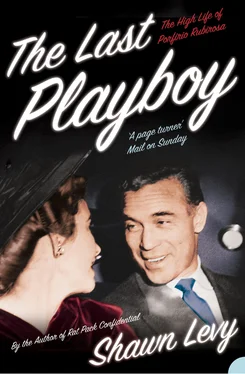1 ...6 7 8 10 11 12 ...21 But Trujillo characteristically had another, more cunning scheme for gaining influence over the Dominican elite. If he couldn’t enlist the parents, he would enlist the children. And he found a perfect candidate with whom to begin his campaign: the feckless, French-educated, popular son of the estimable and recently deceased Don Pedro Maria Rubirosa.
In the autumn of 1931, Porfirio was out at a drinking party with friends at the Country Club, another of Santo Domingo’s swank gathering places, when he noticed Trujillo, in full, glistening uniform, presiding over a party of military officers across the room. It was an inauspicious time for the young man: Upon his death a year earlier, Don Pedro had left his son little more than the thin veil of a good reputation—for which, truly, Porfirio had no practical use—and a deathbed wish that he continue his legal education. With the household now dominated by his brother-in-law Gilberto Sánchez Lustrino, a dreary future seemed probable. Obviously the opportunity to return to Paris was negligible, and the seemingly unavoidable legal studies would clearly tear him from the sporting, leisurely life of the streets of Santo Domingo.
Sánchez Lustrino was a true Dominican bourgeois, more dedicated to shows of courtliness and refinement than Don Pedro had ever been, a born-and-bred member of that class of gentlefolk who sneered, sometimes openly, at the pretenses of the rustic new president. And, as Porfirio didn’t care much for his brother-in-law, he was particularly pleased when an aide of Trujillo’s came to the table that night at the Country Club and told Porfirio that the president wanted to see him.
As he approached the group of soldiers who, in contrast to his boisterous friends, sipped their drinks in tightly wound decorum, Porfirio observed that “one man dominated with his energetic mien, his dark and severe gaze, a certain hidden brutality and his impeccable uniform: Trujillo.” But when he was introduced to this forbidding man, a chameleonic transformation occurred before his eyes. “I was stupefied at the change that came over him,” he later recalled. “His severe expression disappeared, and he seemed very pleased to meet the son of an old friend.” *
Porfirio knew that Trujillo had attempted to lure Don Pedro into the byzantine scheme by which he gained control of the country and that his father, partly because of his ill health, partly because he genuinely desired that his nation’s future be decided democratically, demurred. So he wasn’t entirely surprised that Trujillo made mention of his grief at Don Pedro’s passing: “You know, I was very pained by your father’s death. Men like him are what we lack today.”
Likewise, Porfirio wasn’t surprised that Trujillo failed to be impressed by his choice of profession. “Students, always with their noses in books!” he snorted. “If we don’t advance more quickly, it’s because young men like you don’t participate in this great effort.”
But there was a surprise coming: Hard on that admonition, Trujillo gently suggested that Porfirio meet him at the National Palace the next morning to discuss his future, say 10 A.M. The matter agreed, the older man stood and, begging pardon, left the club, but not without a final invitation: “Sit here with your friends. Tonight you are the guests of the President!” Porfirio waved his chums over and they joined the soldiers, who slackened their rigid posture when Trujillo left and drank brandy and champagne with the young men until the early morning hours.
He returned home and prepared for his meeting, his head heavy from the night’s indulgences. At the palace, he found Trujillo characteristically alert, erect, immaculate, and direct.
“Did you enjoy yourself last night?”
“Thanks to you, Mr. President.”
“Very good. Now let’s get to more serious matters. I am going to make you a lieutenant in my Presidential Guard.”
There was no time—or, indeed, reason—for retort. Trujillo immediately sent a lackey to fetch an administrative official, to whom he announced, “I have just named Señor Rubirosa a lieutenant. I want to see him in uniform immediately. Take him to my personal tailor, my shoemaker and my gunsmith. Tonight he’ll enter the military training academy.”
As he was outfitted in the splendor that Trujillo demanded for himself and those closest to him, Porfirio tried to wrap his mind around the situation. “At 22,” he admitted, “this was a windfall … I was sufficiently vain to believe that my personality and the name of my family had occasioned this treatment by the General.” But he managed as well to plumb Trujillo’s deeper motives. Addicted to gossip—especially as a means of dominating its subjects—Trujillo had heard about Don Pedro’s popular boy-about-town and determined to use the young man’s social standing for his own purposes. Porfirio understood it instinctively: “He had resolved to get the golden youth of the island involved in the reform of his army. I seemed a young man well suited for this plan because of the prestige of my father and the esteem that my Parisian education had among young men of my generation.”
At heart, he understood Trujillo because the two were cut of the same material: “The General was a tíguere ,” he recollected, “crueler than any of the other tígueres Santo Domingo had known before. This tíguere was smarter than a fox.” In time, their relationship would evolve into a complete symbiosis. Trujillo, capable of the most ruthless acts, would pass virtually all his life in the Dominican Republic to keep his iron fist on its affairs, would commit the most ruthless acts of violence and immorality to suit his pleasure and his power, but would always take especial care to maintain at least a show of public decency. Porfirio, who would eventually emerge as his country’s most visible emissary to the outside world, habitually engaged in a more extroverted and sensational form of tíguerismo , based not on the ruthless wielding of fear but on suavity, dash, ambition, charm, and magnetism. He would provide the sophisticated public face of a brutal regime while Trujillo would, in turn, provide a steely foundation for his stupendous adventures—a mutuality that Trujillo seemed almost to have planned from the start.
It began when, hung over and greedy, Porfirio swallowed the bait dangled before him, allowing yet another of the older man’s schemes to unfold exactly as it had been planned. “Just as Trujillo imagined,” he confessed, “many young men of the Dominican upper classes followed me.”
He didn’t care if he was being used. Military life, contrary to expectations, appealed to him. As he would recall, “Physical efforts filled our days: calisthenics, various sports, arms training, target practice, horseback riding. For a young man like me, it was paradise.” It was made for him: the smart, elaborate uniforms, the camaraderie of fellow junior officers, the freedom from the responsibility to feed or house himself or define his days.
He loved his uniforms, and he looked brilliant in them: pinch-waisted, sharp-jawed, muscular, whippy, with a tight crown of wavy hair, a broad forehead, dark almond-shaped eyes, wide cheekbones, and that café au lait complexion. He wore his hair longer than other soldiers and his boots were more suited to gentlemanly pursuits than to combat or training. If the elite society of Santo Domingo wasn’t yet prepared to accept Trujillo and his military, there were certainly young ladies whose eyes, and more, would readily be caught by the spectacle of this handsome, cultured young officer. He was in his glory.
His golden impression of his new life wasn’t shared at home. His brother-in-law asserted his domain over the household by refusing to allow a soldier to live under his roof. Porfirio simply moved into the barracks.
Читать дальше












